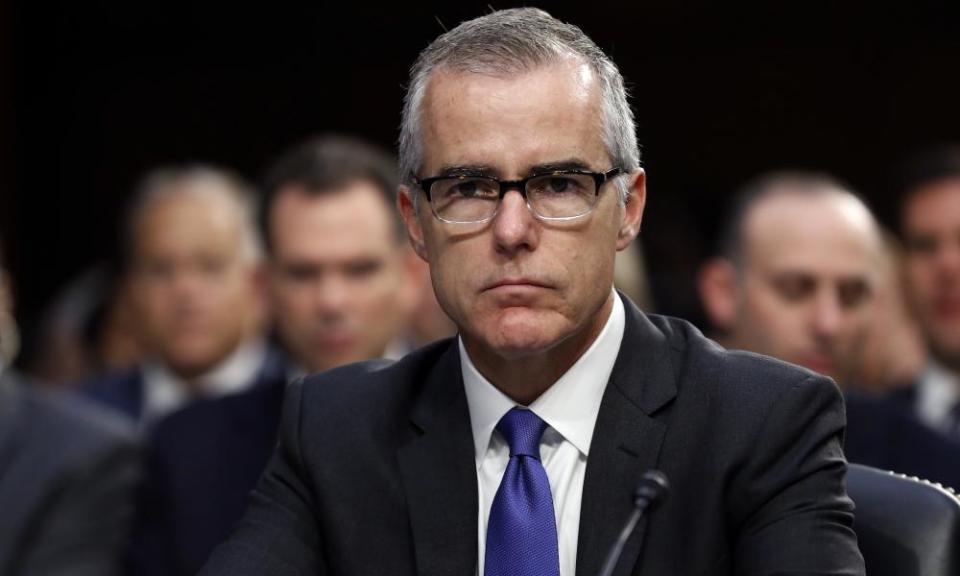FBI deputy director Andrew McCabe steps down early
McCabe has exited ahead of his planned retirement amid an escalation by Donald Trump in attacks on the FBI

Andrew McCabe, the deputy director of the FBI, stepped down on Monday in a widely anticipated move that nevertheless reflected a further deterioration in relations between the White House and authorities investigating Donald Trump’s Russia ties.
The move came after months of attacks on McCabe by the president, who implied that McCabe had been compromised by a political donation made in 2015 to McCabe’s wife.
Sarah Sanders, the White House press secretary, sought to distance the administration from McCabe’s departure.
“We’ve seen the numerous reports, as all of you have,” she said. “I can tell you none of this decision was made by anyone at the White House.”
Sanders added: “We don’t have any specific comments and I would refer you to the FBI for any specifics on the things taking place today.”
She insisted that Trump “stands by his previous comments” about McCabe but was not part of the decision-making process. The president has “full confidence” in FBI director Christopher Wray, she added, “and has put the decision at the FBI in his hands”.
Sanders also denied that Trump had pressured special counsel Robert Mueller to wind up his investigation quickly. “The only thing the president has applied pressure to is to make sure we get this resolved so that you guys and everyone else can focus on the things that Americans care about,” she added. “And that is making sure everybody gets the Russia fever out of their system once and for all, that you’re all reminded once again there was no collusion.”
The immediate circumstances of McCabe’s departure were unclear. He had not previously described plans to colleagues to depart so soon. The FBI did not immediately release comment on the move.
Beyond Mueller
Three separate congressional committees are investigating Russian tampering in the 2016 presidential election and possible collusion between Russia and the Trump campaign: the Senate judiciary and intelligence committees, and the House intelligence committee.
The committees have the power to subpoena witnesses and documents. The list of witnesses to have been interviewed so far is long, and includes Donald Trump Jr and Jared Kushner, as well as lesser figures such as former adviser Carter Page; Glenn Simpson, the co-founder of Fusion GPS, which commissioned the Steele dossier; and Ben Rhodes, the former Obama adviser.
Senate intelligence committee
The most aggressive of the three committees so far, with a reasonable appearance of bipartisanship. Republican chairman Richard Burr of North Carolina said in October that the question of potential collusion between the Trump campaign and Russian operatives remained open. But Burr has also said the committee was not focused on “criminal acts” but a larger picture. The committee notably heard testimony from James Comey after the former FBI director was fired.
Senate judiciary committee
Hampered early on by partisan disagreement about the scope of its investigation, the committee has interviewed top witnesses including Donald Trump Jr and has taken a particular focus on the firing of James Comey. But the committee has deferred to Mueller in the investigation of Paul Manafort and has interviewed fewer witnesses than others.
House intelligence committee
Riven by partisan conflict, the committee appears to be on track to produce two reports – one from each party. Chairman Devin Nunes recused himself from the inquiry in March after Trump tweeted that Barack Obama had "tapp[ed] my phones" and Nunes, in an apparent attempt to defend the president, revealed that some communications involving Trump aides had been intercepted by US surveillance programs.
Mueller, who himself is a former FBI director, is investigating whether Trump or his associates colluded with Russia in advance of the 2016 election, or sought thereafter to obstruct Russia-related investigations. Trump has denied all wrongdoing.
McCabe became acting director of the FBI in May 2017, after Trump fired director James Comey, who was only four years into a nominal 10-year term. McCabe soon found himself under attack by Trump, who tweeted in July that McCabe ought to have been fired because his wife, Jill McCabe, received money for a state senate race “from Hillary Clinton and her representatives”.
Jill McCabe’s campaign received money during the race from a political group tied to Virginia governor Terry McAuliffe, a long-time Clinton supporter.
“The wife got $500 from Terry,” Trump said recently, criticising the donation. “Terry is Hillary.”
McCabe himself was a registered Republican as recently as 2016, when he voted in the Republican primary in Virginia, CNN reported.
McCabe’s retirement plans first became known in December, after the deputy director sat for closed-door interviews before three congressional committees that Democrats described as poisonously partisan, with Republicans following Trump’s lead in attacking McCabe.
Mueller is believed to be examining Trump’s attacks on law enforcement figures involved in the Russia investigation as part of a potential obstruction of justice case against the president.
Trump’s targets have included mostly Republicans or former Republicans, including Comey and Mueller. Last week Republicans briefly advanced allegations of a “secret society” at work inside the FBI to damage the president, allegations that were withdrawn when challenged.

